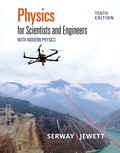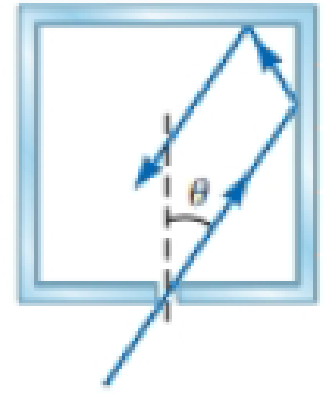
Physics for Scientists and Engineers with Modern Physics
10th Edition
ISBN: 9781337671729
Author: SERWAY
Publisher: Cengage
expand_more
expand_more
format_list_bulleted
Concept explainers
Textbook Question
Chapter 34, Problem 50AP
Figure P34.50 shows a top view of a square enclosure. The inner surfaces are plane mirrors. A ray of light enters a small hole in the center of one mirror. (a) At what angle θ must the ray enter if it exits through the hole after being reflected once by each of the other three mirrors? (b) What If? Are there other values of θ for which the ray can exit after multiple reflections? If so, sketch one of the ray’s paths.
Figure P34.50

Expert Solution & Answer
Trending nowThis is a popular solution!

Students have asked these similar questions
Please solve and answer this problem correctly please. Thank you!!
Please solve and answer this problem correctly please. Thank you!!
a) Use the node-voltage method to find v1, v2, and
v3 in the circuit in Fig. P4.14.
b) How much power does the 40 V voltage source
deliver to the circuit?
Figure P4.14
302
202
w
w
+
+
+
40 V
V1
80 Ω 02
ΣΑΩ
28 A
V3 +
w
w
102
202
Chapter 34 Solutions
Physics for Scientists and Engineers with Modern Physics
Ch. 34.3 - Prob. 34.1QQCh. 34.4 - If beam is the incoming beam in Figure 34.10b,...Ch. 34.4 - Light passes from a material with index of...Ch. 34.6 - Prob. 34.4QQCh. 34.7 - Prob. 34.5QQCh. 34 - In an experiment to measure the speed of light...Ch. 34 - Prob. 2PCh. 34 - As a result of his observations, Ole Roemer...Ch. 34 - Prob. 4PCh. 34 - You are working for an optical research company...
Ch. 34 - Prob. 6PCh. 34 - Prob. 7PCh. 34 - Prob. 8PCh. 34 - Prob. 9PCh. 34 - A ray of light strikes a flat block of glass (n =...Ch. 34 - Prob. 11PCh. 34 - Prob. 12PCh. 34 - Prob. 13PCh. 34 - Prob. 14PCh. 34 - When you look through a window, by what time...Ch. 34 - Prob. 16PCh. 34 - You have just installed a new bathroom in your...Ch. 34 - Prob. 18PCh. 34 - Prob. 19PCh. 34 - Prob. 20PCh. 34 - Prob. 21PCh. 34 - A submarine is 300 m horizontally from the shore...Ch. 34 - Prob. 23PCh. 34 - Prob. 24PCh. 34 - Prob. 25PCh. 34 - Prob. 26PCh. 34 - Prob. 27PCh. 34 - Prob. 28PCh. 34 - Prob. 29PCh. 34 - Prob. 30PCh. 34 - An optical fiber has an index of refraction n and...Ch. 34 - Prob. 32APCh. 34 - How many times will the incident beam in Figure...Ch. 34 - Prob. 34APCh. 34 - Prob. 35APCh. 34 - Prob. 36APCh. 34 - Prob. 37APCh. 34 - Prob. 38APCh. 34 - Prob. 39APCh. 34 - A light ray enters the atmosphere of a planet and...Ch. 34 - Prob. 41APCh. 34 - Prob. 42APCh. 34 - Prob. 43APCh. 34 - Prob. 44APCh. 34 - Prob. 45APCh. 34 - Prob. 46APCh. 34 - Prob. 47APCh. 34 - Prob. 48APCh. 34 - Prob. 49APCh. 34 - Figure P34.50 shows a top view of a square...Ch. 34 - Prob. 51APCh. 34 - Prob. 52CPCh. 34 - Prob. 53CPCh. 34 - Pierre de Fermat (16011665) showed that whenever...Ch. 34 - Prob. 55CPCh. 34 - Prob. 56CPCh. 34 - Prob. 57CP
Knowledge Booster
Learn more about
Need a deep-dive on the concept behind this application? Look no further. Learn more about this topic, physics and related others by exploring similar questions and additional content below.Similar questions
- Please solve and answer this problem correctly please. Thank you!!arrow_forwardYou're on an interplanetary mission, in an orbit around the Sun. Suppose you make a maneuver that brings your perihelion in closer to the Sun but leaves your aphelion unchanged. Then you must have Question 2 options: sped up at perihelion sped up at aphelion slowed down at perihelion slowed down at aphelionarrow_forwardThe force of the quadriceps (Fq) and force of the patellar tendon (Fp) is identical (i.e., 1000 N each). In the figure below angle in blue is Θ and the in green is half Θ (i.e., Θ/2). A) Calculate the patellar reaction force (i.e., R resultant vector is the sum of the horizontal component of the quadriceps and patellar tendon force) at the following joint angles: you need to provide a diagram showing the vector and its components for each part. a1) Θ = 160 degrees, a2) Θ = 90 degrees. NOTE: USE ONLY TRIGNOMETRIC FUNCTIONS (SIN/TAN/COS, NO LAW OF COSINES, NO COMPLICATED ALGEBRAIC EQUATIONS OR ANYTHING ELSE, ETC. Question A has 2 parts!arrow_forward
- The force of the quadriceps (Fq) and force of the patellar tendon (Fp) is identical (i.e., 1000 N each). In the figure below angle in blue is Θ and the in green is half Θ (i.e., Θ/2). A) Calculate the patellar reaction force (i.e., R resultant vector is the sum of the horizontal component of the quadriceps and patellar tendon force) at the following joint angles: you need to provide a diagram showing the vector and its components for each part. a1) Θ = 160 degrees, a2) Θ = 90 degrees. NOTE: USE DO NOT USE LAW OF COSINES, NO COMPLICATED ALGEBRAIC EQUATIONS OR ANYTHING ELSE, ETC. Question A has 2 parts!arrow_forwardNo chatgpt pls will upvotearrow_forwardThe force of the quadriceps (Fq) and force of the patellar tendon (Fp) is identical (i.e., 1000 N each). In the figure below angle in blue is Θ and the in green is half Θ (i.e., Θ/2). A) Calculate the patellar reaction force (i.e., R resultant vector is the sum of the horizontal component of the quadriceps and patellar tendon force) at the following joint angles: you need to provide a diagram showing the vector and its components for each part. a1) Θ = 160 degrees, a2) Θ = 90 degrees. NOTE: USE ONLY TRIGNOMETRIC FUNCTIONS (SIN/TAN/COS, NO LAW OF COSINES, NO COMPLICATED ALGEBRAIC EQUATIONS OR ANYTHING ELSE, ETC. Question A has 2 parts!arrow_forward
- ་ The position of a particle is described by r = (300e 0.5t) mm and 0 = (0.3t²) rad, where t is in seconds. Part A Determine the magnitude of the particle's velocity at the instant t = 1.5 s. Express your answer to three significant figures and include the appropriate units. v = Value Submit Request Answer Part B ? Units Determine the magnitude of the particle's acceleration at the instant t = 1.5 s. Express your answer to three significant figures and include the appropriate units. a = Value A ? Unitsarrow_forwardSolve and answer the question correctly please. Thank you!!arrow_forwardSolve and answer the question correctly please. Thank you!!arrow_forward
arrow_back_ios
SEE MORE QUESTIONS
arrow_forward_ios
Recommended textbooks for you
 Physics for Scientists and EngineersPhysicsISBN:9781337553278Author:Raymond A. Serway, John W. JewettPublisher:Cengage Learning
Physics for Scientists and EngineersPhysicsISBN:9781337553278Author:Raymond A. Serway, John W. JewettPublisher:Cengage Learning Physics for Scientists and Engineers with Modern ...PhysicsISBN:9781337553292Author:Raymond A. Serway, John W. JewettPublisher:Cengage Learning
Physics for Scientists and Engineers with Modern ...PhysicsISBN:9781337553292Author:Raymond A. Serway, John W. JewettPublisher:Cengage Learning Physics for Scientists and Engineers: Foundations...PhysicsISBN:9781133939146Author:Katz, Debora M.Publisher:Cengage Learning
Physics for Scientists and Engineers: Foundations...PhysicsISBN:9781133939146Author:Katz, Debora M.Publisher:Cengage Learning Principles of Physics: A Calculus-Based TextPhysicsISBN:9781133104261Author:Raymond A. Serway, John W. JewettPublisher:Cengage Learning
Principles of Physics: A Calculus-Based TextPhysicsISBN:9781133104261Author:Raymond A. Serway, John W. JewettPublisher:Cengage Learning Physics for Scientists and Engineers, Technology ...PhysicsISBN:9781305116399Author:Raymond A. Serway, John W. JewettPublisher:Cengage Learning
Physics for Scientists and Engineers, Technology ...PhysicsISBN:9781305116399Author:Raymond A. Serway, John W. JewettPublisher:Cengage Learning College PhysicsPhysicsISBN:9781285737027Author:Raymond A. Serway, Chris VuillePublisher:Cengage Learning
College PhysicsPhysicsISBN:9781285737027Author:Raymond A. Serway, Chris VuillePublisher:Cengage Learning

Physics for Scientists and Engineers
Physics
ISBN:9781337553278
Author:Raymond A. Serway, John W. Jewett
Publisher:Cengage Learning

Physics for Scientists and Engineers with Modern ...
Physics
ISBN:9781337553292
Author:Raymond A. Serway, John W. Jewett
Publisher:Cengage Learning

Physics for Scientists and Engineers: Foundations...
Physics
ISBN:9781133939146
Author:Katz, Debora M.
Publisher:Cengage Learning

Principles of Physics: A Calculus-Based Text
Physics
ISBN:9781133104261
Author:Raymond A. Serway, John W. Jewett
Publisher:Cengage Learning

Physics for Scientists and Engineers, Technology ...
Physics
ISBN:9781305116399
Author:Raymond A. Serway, John W. Jewett
Publisher:Cengage Learning

College Physics
Physics
ISBN:9781285737027
Author:Raymond A. Serway, Chris Vuille
Publisher:Cengage Learning
Convex and Concave Lenses; Author: Manocha Academy;https://www.youtube.com/watch?v=CJ6aB5ULqa0;License: Standard YouTube License, CC-BY